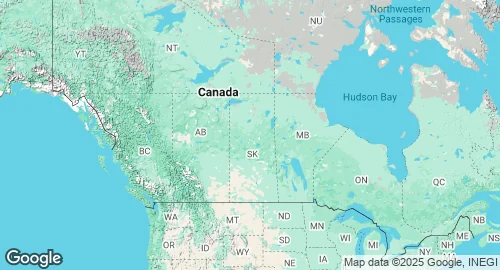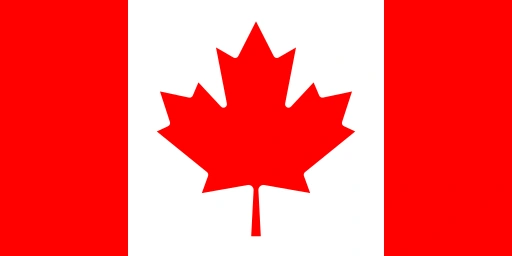Canada Military Forces 🇨🇦
Military Strength Overview
| 🛩️ Air Force | 351 active aircraft |
| ⚓️ Naval forces |
66 ships in fleet
– incl. 4 submarines |
| 🪖 Active Troops | 67,400 personnels |
| ⛑️ Reserve Troops | 35,600 personnels |
| 👮♀️ Paramilitary | 4,500 personnels |
| 🗺️ Air bases | 13 active air bases |
| 🎖️ Military ranks | 57 ranks listed |
Global Military Index
| 🪖 Manpower (15%) | 70.5 | Active, reserve & paramilitary: 86550 effective |
| 🛡️ Ground Firepower (20%) | 41.7 | Main battle tanks: 74 |
| ⚓ Naval Power (20%) | 55.3 | Weighted by ship type: carriers, submarines, destroyers... |
| ✈️ Air Power (25%) | 57.7 | Weighted by aircraft type: combat, bombers, helicopters... |
| ☢️ Nuclear Deterrent (10%) | 0.0 | No declared nuclear capability |
| 💰 Defense Budget (10%) | 68.7 | $29347M annual military spending |
Methodology: Log-scaled composite index using SIPRI, IISS, and GMNET data. Each pillar is normalized to 0-100, then weighted by strategic importance.
Defense Statistics & Key Metrics
| Population | 40.1 million (2023) |
| GDP | $2.1 trillion (2023) |
| GDP per capita | $53431 (2023) |
| Military Budget | $29.3 billion (2024) |
| Share of GDP in Milex | 1.3% (2024) |
| Share of Govt Expenditures | 3.1% (2024) |
| Military spends per capita | $742 (2024) |
| Inflation Rate | 2.38% (2024) |
| Military Personnel | 72,000 (2020) |
Canadian Military Budget History
Population and Military Personnel Trends
GDP and Inflation Rate Trends
Strategic Overview in 2026
Strategic Position
Canada occupies a geostrategic position bounded by the Atlantic, Pacific, and Arctic Oceans, sharing the world’s longest undefended land border with the United States. National defense is predicated on three pillars: the defense of Canada, the defense of North America, and contributions to international peace and security.
The defense of North America is managed through the North American Aerospace Defense Command (NORAD), a bilateral organization with the United States providing aerospace warning, aerospace control, and maritime warning. Canada is a founding member of NATO and a participant in the Five Eyes intelligence-sharing alliance alongside Australia, New Zealand, the United Kingdom, and the United States.
The 2024 defense policy update, "Our North, Strong and Free," identifies the Arctic as a primary security concern due to climate change increasing accessibility to the region and the presence of Russian and Chinese interests in the High North. In the Indo-Pacific, Canada maintains presence through Operation HORIZON, focusing on regional stability and maritime security. Canada has no direct territorial rivalries but maintains a competitive posture regarding Arctic sovereignty and international maritime law.
Military Forces
The Canadian Armed Forces (CAF) is a unified command structure directed by the Chief of the Defence Staff. Personnel levels consist of approximately 68,000 active-duty members and 27,000 reserve personnel. The CAF is organized into three primary environmental commands: the Canadian Army, the Royal Canadian Navy, and the Royal Canadian Air Force.
The Canadian Army is structured into four regional divisions. Its primary maneuver elements include mechanized infantry battalions and armored regiments. The inventory includes Leopard 2 main battle tanks in A4, A4M, and A6 configurations. The primary infantry fighting vehicle is the Light Armoured Vehicle (LAV) 6.0, supplemented by the Tactical Armoured Patrol Vehicle (TAPV).
The Royal Canadian Navy (RCN) operates a fleet of Halifax-class multi-role patrol frigates, which are currently undergoing life-extension programs. The fleet also includes Victoria-class long-range patrol submarines, Kingston-class maritime coastal defense vessels, and Harry DeWolf-class Arctic and Offshore Patrol Ships (AOPS).
The Royal Canadian Air Force (RCAF) provides aerospace power through a fleet of CF-18 Hornet fighter aircraft. For strategic and tactical airlift, the RCAF utilizes CC-177 Globemaster III, CC-130J Hercules, and CC-150 Polaris aircraft. Maritime patrol is conducted by the CP-140 Aurora, while rotary-wing capabilities include the CH-147F Chinook, CH-148 Cyclone, and CH-146 Griffon.
Specialized capabilities are managed under the Canadian Special Operations Forces Command (CANSOFCOM), which includes Joint Task Force 2 (JTF2), the Canadian Special Operations Regiment (CSOR), and 427 Special Operations Aviation Squadron. In 2025, the CAF continued the integration of the Canadian Forces Cyber Command to manage defensive and offensive cyber operations.
Defense Industry
Canada maintains a specialized defense industrial base focused on land systems, aerospace, and shipbuilding. General Dynamics Land Systems-Canada (GDLS-C) produces the LAV series of armored vehicles for domestic use and export. The National Shipbuilding Strategy (NSS) governs the long-term domestic production of naval vessels through Irving Shipbuilding and Seaspan Shipyards.
The aerospace sector includes CAE, which provides simulation and training technologies globally. While Canada produces specialized components and platforms, it relies on the United States for high-end systems, such as fifth-generation fighter aircraft and advanced missile technology. International collaboration is common, as seen in the participation in the F-35 Joint Strike Fighter program.
Strategic Trends
Defense spending is projected to reach 1.76% of GDP by 2030, with an ongoing commitment to reach the NATO 2% benchmark. Modernization priorities focus on NORAD modernization, including the North Warning System and over-the-horizon radar installations.
The Canadian Surface Combatant (CSC) project—designated the River-class—is the largest procurement program in the RCN's history, intended to replace the Halifax-class frigates and Iroquois-class destroyers. For the RCAF, the acquisition of F-35A Lightning II aircraft is underway to replace the aging CF-18 fleet. Additionally, the Canadian Multi-Mission Aircraft (CMMA) program has selected the P-8A Poseidon to replace the CP-140 Aurora for maritime surveillance and anti-submarine warfare.
Operational constraints include persistent recruitment and retention challenges, leading to a personnel shortfall across several technical trades. Force structure shifts include an increased emphasis on persistent presence in the Arctic through the construction of the Nanisivik Naval Facility and the deployment of sensors for underwater domain awareness. In 2025, the CAF prioritized the acquisition of long-range precision fires and integrated air and missile defense systems to address evolving conventional threats.
Canadian Aircraft Manufacturing
| Model | Manufacturer | Year | Number |
|---|---|---|---|
| Alarus CH2000 | AMD | 1995 | 150 |
| BD-700 Global Express | Bombardier | 1996 | 816 |
| CF-100 Canuck | Avro | 1950 | 692 |
| CF-105 Arrow | Avro | 1958 | 5 |
| CL-41 Tutor | Canadair | 1960 | 212 |
| CL-415 Super Scooper | Viking Air | 1993 | 95 |
| CL-600 Challenger | Bombardier | 1978 | 1066 |
| DHC-2 Beaver | De Havilland Canada | 1947 | 1657 |
| DHC-3 Otter | De Havilland Canada | 1951 | 466 |
| DHC-5 Buffalo | De Havilland Canada | 1964 | 122 |
| DHC-6 Twin Otter | De Havilland Canada | 1965 | 985 |
| DHC-7 Dash 7 | De Havilland Canada | 1975 | 113 |
| DHC-8 Dash 8 | De Havilland Canada | 1983 | 1258 |
| Learjet 35 | Bombardier | 1973 | 738 |
| Learjet 45 | Bombardier | 1995 | 642 |
Canadian Naval Shipbuilding
Canadian Firearms Development
| Model | Category |
|---|---|
| Timberwolf .338 PGW | Sniper rifle |
Frequently Asked Questions
How large is Canada's military?
What is Canada's defense budget?
How does Canada rank militarily in the world?
Does Canada have nuclear weapons?
How many aircraft does Canada's air force have?
How large is Canada's navy?
How many tanks does Canada have?
What percentage of GDP does Canada spend on defense?
What is Canada's military personnel per capita?
Does Canada have submarines?
Does Canada have paramilitary forces?
Military Expenditure: SIPRI Milex. Suggest a change

